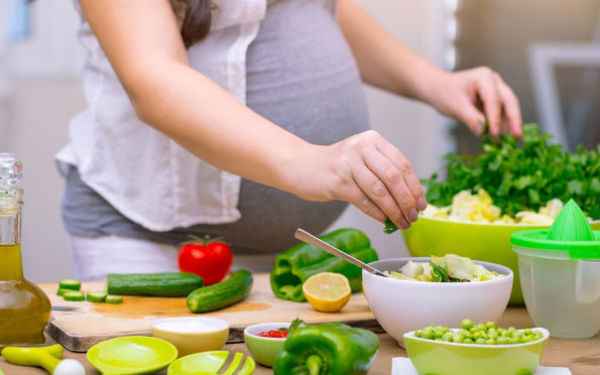A Guide to Vegan Foods During Pregnancy

Should I change my vegetarian diet to get pregnant? Is it safe to eat a vegetarian diet during pregnancy? These may be your questions too. In general, a balanced plant-based diet can provide all the nutrients needed for a healthy pregnancy. But never suddenly change your diet to a vegan or vegetarian diet during or very close to pregnancy.
If you are also on a vegan or vegetarian diet, pay special attention to the intake of protein, vitamin B12, calcium, vitamin D, zinc and iron during pregnancy and after giving birth while breastfeeding, because these nutrients are important for your body, cell growth , the development of the fetus's brain and other organs, and the baby's weight gain are vital, and as long as you eat a wide range of healthy plant foods and plan your diet to include key nutrients for a vegetarian expectant mother, you can get all the nutrients you need. Get what you and your baby need, but:
Never suddenly change your diet to a vegan or vegetarian diet during or very close to your pregnancy.
It's best to see a nutritionist to make sure your diet is balanced during pregnancy, especially if you're on a vegan diet.
In some cases, you'll need to rely on fortified foods or supplements to make sure you're getting enough of each nutrient you need.
In the pre-pregnancy examinations or in the first care of the pregnancy period, let your doctor know about your diet.
Along with eating a wide variety of fruits, fresh vegetables and whole grain products, you should make sure you are getting the necessary supplements.
Pregnancy supplements are very important for pregnant women who follow a vegan diet.
Always talk to your doctor, midwife or nutritionist before taking any supplements.
If you are vegan, meaning you don't eat any animal products including animal meat, eggs, dairy and honey, read her mother's article on vegan food during pregnancy. But what foods should a pregnant vegetarian mother eat?
Protein
Protein is made of structures called amino acids, which are essential for cell growth and embryo development. So eat several meals of protein-rich food every day. Good sources of protein include eggs, dairy products, legumes, soy products, nuts, seeds, and nut butters. Suggestions for including these foods in your diet:
Add beans such as red, black or white beans, peas, lentils or tofu to your salad.
Make and eat bean burritos or bean dishes with different recipes.
As a snack, eat a handful of almonds, walnuts, cashews, sunflower seeds, or roasted chickpeas.
Spread on whole grain bread or apple slices, peanut butter or almond butter.
Eat yogurt or cottage cheese as a snack.
Eat the hard-boiled egg slices with a salad or greens.
A vegetarian diet that includes eggs and dairy products can provide high-quality protein, but an exclusively plant-based vegan diet requires more careful planning and a variety of plant-based protein sources should be included in your daily diet.
iron
You will have a blood test early in your pregnancy to check your iron levels. If your blood iron is low, your doctor may recommend that you take an iron supplement. Your pregnancy supplement will probably have some iron, but you should also eat several servings of iron-rich foods each day. Good sources of iron include:
Cerlak with iron-enriched breakfast cereals
Foods made from whole or enriched grains such as bread and pasta
Tofu, Tempeh and other foods with soybean origin
Eat leafy vegetables like spinach and greens
Avoid drinking tea or coffee with your meals as well, as these beverages contain tannins and polyphenols that make it harder for the body to absorb iron from vegetables. Instead, eat something high in vitamin C, as vitamin C helps your body absorb iron. For example, eat homemade orange juice, homemade tomato sauce or various homemade sauces to help your body absorb iron.
You can also puree broccoli, cauliflower, avocado, carrots, spinach, celery, and then mix any two or three of these vegetables that you think taste best together, then add olive oil and spices. Optionally, prepare homemade sauces of your own invention.
zinc or zinc
Zinc in plant foods is not absorbed very well by the body, so you need to have a plan to get zinc in your diet. Good sources of zinc include whole grains, such as whole grain bread, legumes, such as beans and lentils, soy products, vegetables, milk and yogurt.
Try to eat a few servings of zinc-rich foods every day. Many foods that provide iron, such as fortified breakfast cereals, beans, soy-based foods, and whole grains, also contain zinc. Other good sources of zinc for vegetarians include nuts, seeds, and cheese.
Calcium
Eat several servings of calcium-rich foods every day. Good sources of calcium include:
Milk, cheese and yogurt
Almond milk or soy milk, fruit juice and calcium-enriched breakfast cereals
Almonds or sesame seeds
White beans, molasses or blackstrap molasses, chickpeas, calcium-fortified tofu (look for a calcium salt such as calcium chloride or calcium sulfate in the ingredients list to find out if tofu is calcium-fortified.)
برای نمایش آواتار خود در این وبلاگ در سایت Gravatar.com ثبت نام کنید. (راهنما)






















































ایمیل شما بعد از ثبت نمایش داده نخواهد شد